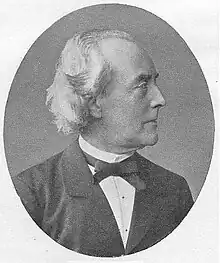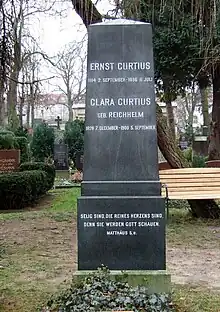Ernst Curtius
Ernst Curtius (/ˈkʊərtsiˌʊs/; 2 September 1814 – 11 July 1896) was a German archaeologist, historian and museum director. [1]
Ernst Curtius | |
|---|---|
 Photograph from Imagines Philologorum by Alfred Gudeman | |
| Born | 2 September 1814 |
| Died | 11 July 1896 (aged 81) Berlin |
| Nationality | German |
| Known for | Olympia |
| Scientific career | |
| Fields | archaeology |
.jpg.webp)
Biography

He was born in Lübeck. On completing his university studies he was chosen by C. A. Brandis to accompany him on a journey to Greece for the prosecution of archaeological researches. Curtius then became Karl Otfried Müller's companion in his exploration of the Peloponnese, and on Müller's death in 1840 he returned to Germany. In 1844 he became an extraordinary professor at the University of Berlin, and in the same year he was appointed tutor to Prince Frederick William (afterwards the Emperor Frederick III), a post which he held until 1850.[2]
After holding a professorship at Göttingen and undertaking a further journey to Greece in 1862, Curtius was appointed (in 1863) ordinary professor at Berlin. In 1874 he was sent to Athens by the German government and there concluded an agreement by which the excavations at Olympia were entrusted exclusively to Germany. In 1891 Curtius was elected a member of the American Antiquarian Society.[3] Curtius died in Berlin on 11 July 1896.[4]
Excavation in Olympia
On 10 June 1852 Ernst Curtius delivered his famous oration on Olympia at the Singakademie in Berlin in the presence of royal family, which marked the first step towards excavations of Olympia, and gave great impetus for the historical archaeological works in Greece.[1] Following the death of Eduard Gerhard in 1867, Curtius succeeded him as professor of classical archaeology at Berlin. At the same time, Curtius served as a director of the Altes Museum and Antiquarium. The Turko-Russian War (1877-78) delayed the process of reaching an agreement between Greek and German governments for undertaking excavation at Olympia.[1]
Curtius's imperial connections helped him to convince the government to nationalize the German Archaeological Institute in 1874, and open a branch in Athens. In 1874, the Greek government granted the exclusive right to the German Archaeological Institute to excavate at Olympia. A landmark agreement in the history of archaeology was signed by Curtius on 25 April 1874 at Athens, which mandated the Germans to leave all finds in Greece.[5] A special museum was built on the site for this purpose.[6]
In 1875 Curtius led large-scale expeditions of archeologists to systematically unearth Olympia.[7] The first excavation was begun at Olympic in Elis, the original Olympic site, where for a thousand years, the Olympic Games had been held.[5] Within six years, they cleared the Olympic stadium, with its runner’s starting blocks and judges’ seat. The excavators also uncovered temple of Zeus’s and Hera.[8][6]
The findings were published in scientific journals in voluminous throughout Europe between 1890 and 1897. Similarly, the German archaeologists were able to bring to life the knowledge of Olympic with paintings of the Olympic site, and the procedures of the Olympic Games. These helped the western world to understand the importance of reviving the Olympic Games.[8]
Works
His best-known work is his History of Greece (1857–1867). It presented in an attractive style what were then the latest results of scholarly research, but it was criticized as wanting in erudition. It is now superseded. His other writings are chiefly archaeological. The most important are:
- Die Akropolis von Athen (1844)
- Naxos (1846)
- Peloponnesos, eine historisch-geographische Beschreibung der Halbinsel (1851)
- Olympia (1852)
- Die Ionier vor der ionischen Wanderung (1855)
- Attische Studien (1862–1865)
- Ephesos (1874)
- Die Ausgrabungen zu Olympia (1877, etc.)
- Olympia und Umgegend (edited by Curtius and F. Adler, 1882)
- Olympia. Die Ergebnisse der von dem deutschen Reich veranstalteten Ausgrabung (with F. Adler, 1890–1898)
- Die Stadtgeschichte von Athen (1891)
- Gesammelte Abhandlungen (1894)[9]
His collected speeches and lectures were published under the title of Altertum und Gegenwart (5th ed., 1903 foll.), to which a third volume was added under the title of Unter drei Kaisern (2nd ed., 1895).[9]
Family
His brother, Georg Curtius, was a noted philologist.
References
- Notes
- Thomson de Grummond, Nancy (11 May 2015). Encyclopedia of the History of Classical Archaeology. Oxon: Routledge. p. 341. ISBN 978-0-313-30204-6. Retrieved 13 February 2022.
- Chisholm 1911, p. 652.
- American Antiquarian Society Members Directory
- Chisholm 1911, pp. 652–653.
- Dudley Warner, Charles (1 Jun 2008). A Library of the World's Best Literature - Ancient and Modern - Vol. X. New York: Cosimo, Inc. p. 4241. ISBN 978-1-176-78861-9. Retrieved 13 February 2022.
- Fagan, Brian (10 April 2018). A Little History of Archaeology. New Haven: Yale University Press. p. 103. ISBN 978-0-300-22464-1. Retrieved 13 February 2022.
- Fischer-Lichte, Erika (7 May 2007). Theatre, Sacrifice, Ritual: Exploring Forms of Political Theatre. Oxon: Routledge. p. 69. ISBN 978-0-203-96930-4. Retrieved 13 February 2022.
- Findling, John E. (30 March 2004). Encyclopedia of the Modern Olympic Movement. Santa Barbara: Greenwood Publishing Group. p. 63. ISBN 978-0-313-32278-5. Retrieved 13 February 2022.
- Chisholm 1911, p. 653.
- Sources
- This article incorporates text from a publication now in the public domain: Chisholm, Hugh, ed. (1911). "Curtius, Ernst". Encyclopædia Britannica. Vol. 7 (11th ed.). Cambridge University Press. pp. 652–653. This work in turn cites:
- L. Gurlitt, Erinnerungen an Ernst Curtius (Berlin, 1902) This work has a full list of his writings.
- Otto Kern (1903), "Curtius, Ernst", Allgemeine Deutsche Biographie (ADB) (in German), vol. 47, Leipzig: Duncker & Humblot, pp. 580–597
- F. Curtius, Ernst Curtius. Ein Lebensbild in Briefen (1903)
- T. Hodgkin, Ernest Curtius (1905)
External links
- Beach, Chandler B., ed. (1914). . . Chicago: F. E. Compton and Co.
 Media related to Ernst Curtius at Wikimedia Commons
Media related to Ernst Curtius at Wikimedia Commons- Works by Ernst Curtius at LibriVox (public domain audiobooks)

- An Olympic Excavation, a description of Curtius' excavations at Olympia
- Ernst Curtius Papers. General Collection, Beinecke Rare Book and Manuscript Library, Yale University.